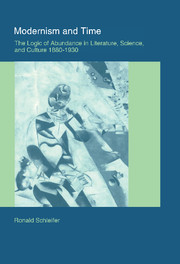Book contents
- Frontmatter
- Contents
- Preface
- Introduction:Post-Englightment Modernism and the experience of time
- PART I POST-ENLIGHTENMENT APPREHENSIONS
- 1 The Enlightenment, abundance, and postmodernity
- 2 Temporal allegories: George Eliot, Walter Benjamin, and the redemption of time
- 3 The second Industrial Revolution: history, knowledge, and subhectivity
- PART II LOGICS OF ABUNDANCE
- Notes
- References
- Index
2 - Temporal allegories: George Eliot, Walter Benjamin, and the redemption of time
Published online by Cambridge University Press: 22 September 2009
- Frontmatter
- Contents
- Preface
- Introduction:Post-Englightment Modernism and the experience of time
- PART I POST-ENLIGHTENMENT APPREHENSIONS
- 1 The Enlightenment, abundance, and postmodernity
- 2 Temporal allegories: George Eliot, Walter Benjamin, and the redemption of time
- 3 The second Industrial Revolution: history, knowledge, and subhectivity
- PART II LOGICS OF ABUNDANCE
- Notes
- References
- Index
Summary
An artist such as Goethe, for example, gravitates organically toward an evolving sequence. He strives to perceive all existing contradictions as various stages of some unified development; in every manifestation of the present he strives to glimpse a trace of the past, a peak of the present-day or a tendency of the future …
In contrast to Goethe, Dostoevsky attempted to perceive the very stages themselves in their simultaneity, to juxtapose and counterpose them dramatically, and not to stretch them into an evolving sequence. For him, to get one's bearings in the world meant to conceive all its content as simultaneous, and to guess at their interrelationships in the cross section of a single moment.
M. M. Bakhtin, “The Bildungsroman and Its Significance in the History of Realism” (1986: 28)Time is not a thing.
Martin Heidegger, On Time and Being (1972: 3)This chapter aims at a description of contrary modes of representing time in narrative discourse between 1880 and 1930. Even though the problematics of time is a recurrent theme in Western discourse, in this chapter I examine a notable shift of sensibility in relation to the experience and understanding of time at the beginning of the twentieth century. Why this should be so is the burden of the following chapter, although I have touched upon some of the intellectual conditions for this experience in chapter I.
- Type
- Chapter
- Information
- Modernism and TimeThe Logic of Abundance in Literature, Science, and Culture, 1880–1930, pp. 67 - 107Publisher: Cambridge University PressPrint publication year: 2000



